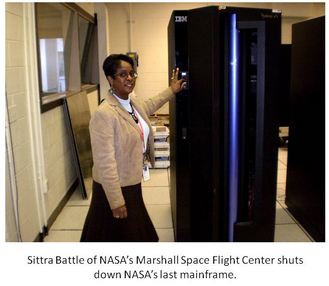NASA Shuts Down Last Mainframe, Signals End of an Era
NASA announced that it has abandoned its last mainframe, an IBM Z9 system.
The mainframe was located at Marshall Space Flight Center in Huntsville, Alabama. The massive, 6-year-old 2094-s54 model has 54 main processors and 512 GB of memory. According to Wikipedia, S54 mainframes cost "millions of dollars" when new. NASA CIO Linda Cureton wrote in a blog post that the shutdown of the Z9 ends the "mainframe era" at NASA. She noted that mainframes still have their place in computing where it does not matter if "end-user interfaces are clunky and somewhat inflexible," when there is a need for a system that delivers "extremely reliable, secure transaction oriented business applications."
According to Cureton, NASA kept the Z9 operational for older applications that are now being phased out. NASA apparently has not developed mainframe application in some time, which made the mainframe a rather costly proposition. Cureton also noted that NASA an save some money by shutting down some software licenses that are tied to the system, which runs Red Hat Enterprise Linux 4 (RHEL4).
NASA's first IBM mainframe, a 360/91 Model, shipped to NASA in 1967.
Get Tom's Hardware's best news and in-depth reviews, straight to your inbox.

Douglas Perry was a freelance writer for Tom's Hardware covering semiconductors, storage technology, quantum computing, and processor power delivery. He has authored several books and is currently an editor for The Oregonian/OregonLive.
-
nforce4max At least by shutting it down they now have a little more room in their budget for other projects and upgrades to other systems they have.Reply -
ben850 I wonder what kind of tasks they gave this powerful machine..Reply
Also makes me wonder what kind of machines the government uses to crack encrypted data. -
ProDigit10 NASA could start renting out the mainframe!Reply
Another option is to sell it, before it becomes slower than a hand cellphone! -
ta152h She forgot to mention performance. The z/196 at 5.2 GHz is considerably more powerful than even a Bulldozer. OK, so is my vintage 8088 if I jack it up to 7.16 MHz.Reply -
A Bad Day Considering the fact that NASA receives less funding than US Air Force's air conditioning costs, why am I not surprised they're forced to slash budgets?Reply
